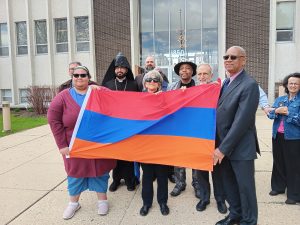109th observance of Armenian Genocide takes place April 9
By Gregory Harutunian for Chronicle Media — April 6, 2024

North Chicago Mayor Leon Rockingham holds the flag with representatives of the local Armenian churches, prior to being lifted on the standard in 2023. (Photo by Gregory Harutunian/for Chronicle Media)
Ceremonial flag-raisings will take place April 9 at the Waukegan and North Chicago city halls, as officials will honor survivors and victims of the Armenian Genocide on its 109th observance.
Proclamations are being prepared by the respective city councils recognizing nearly 1.5 million Armenians killed 1915-16.
The events also recognize the contributions by the Armenian community historically to the growth of both cities. Although the actual commemoration date is traditionally April 24, this is the second consecutive year that the Armenian flag will be raised at both city hall flag standard areas.
“It is an honor to be able to recognize Waukegan’s Armenian community,” said Waukegan mayor Ann Taylor. “Many Armenians came to Waukegan to escape oppression in their ancestral homeland, and seek freedom and opportunity. This ceremonial flag-raising not only commemorates this somber anniversary, it celebrates the positive impact that they have had in the progress of our city.”
North Chicago Mayor Leon Rockingham stated, “The city celebrates our Armenian friends by remembering the 1.5 million lives lost during the targeted genocide of World War I. For the second year, we proudly raise the Armenian flag in solidarity with the Armenian people. We will not forget.”
Lake County is home to St. Paul Armenian Apostolic and St. George Armenian Apostolic churches, with congregations that have a long connection to both cities supplying businesses and labor. Although impacted by attrition over the intervening decades, they are still vibrant and active cultures, as well as testaments to survival.
The Armenian National Committee of Illinois will hold a demonstration in Chicago’s Daley Plaza at 11 a.m. April 24 in conjunction with the Armenian Youth Federation.
In a released statement, “These events bring attention to two atrocities committed against Armenians. First, by the Ottoman Empire, during World War I … this genocide resulted in the death of over 1.5 million Armenians. It is often referred to as the first Genocide of the 20th century.
“Second, the Genocide (being) committed by Azerbaijan with the ethnic cleansing of all the Armenians in Artsakh. There were 150,000 people driven away from their homes, after centuries of family roots there.”
Sam Haroian, a deacon at St. Paul’s, knows the horrors that were perpetrated, and elders from both churches were either first-hand witnesses to the atrocities or survivors. “Over 1.5 million Armenians perished at the hands of the Ottoman government, now modern Turkey,” he said. “These men, women, and children were brutally massacred, butchered, tortured, and starved to death in the most heinous way possible.
“It is important for Armenians to remember, and non-Armenians to learn about these atrocities,” he said. “As time passes, the facts and details of what happened have a tendency to be forgotten or distorted. This flag ceremony is one way to educate this generation and keep the memory alive … so that it does not happen again.”
Alex Dayenian, a deacon at St. George, noted, “The flag-raising is meaningful, especially to the Armenians of Waukegan. This community was largely founded by descendants and survivors of the 1915 massacres. It was here, they found refuge and comfort in maintaining a place of religious worship, and community gatherings were crucial.
“Like a lot of us, my family was directly affected by the forced migration from western Armenia,” he said. “And now, many years later, I try to maintain our western Armenian identity, and likewise, the promise to God, a promise a lot of our ancestors made. A flag-raising is a statement of statehood, legitimacy, ethnic unity, and a common goal … the prosperity of the Armenian nation.”
The Armenian Diaspora is spread throughout the world, although the April 24 date of remembrance is a shared common bond. Armenia was also the first country to adopt Christianity as its national religion.
“St. Paul’s has survived due to the strong Christian faith and commitment of its parishioners, and the support of the community at large,” said Dr. Alta Mekaelian, the church’s board chairperson.
The flag-raising ceremony at Waukegan City Hall, located at 100 N. Martin Luther King Drive, begins at 11 a.m., and at the North Chicago City Hall, located at 1850 Lewis Avenue, starts at 1 p.m., both take place on April 9.



